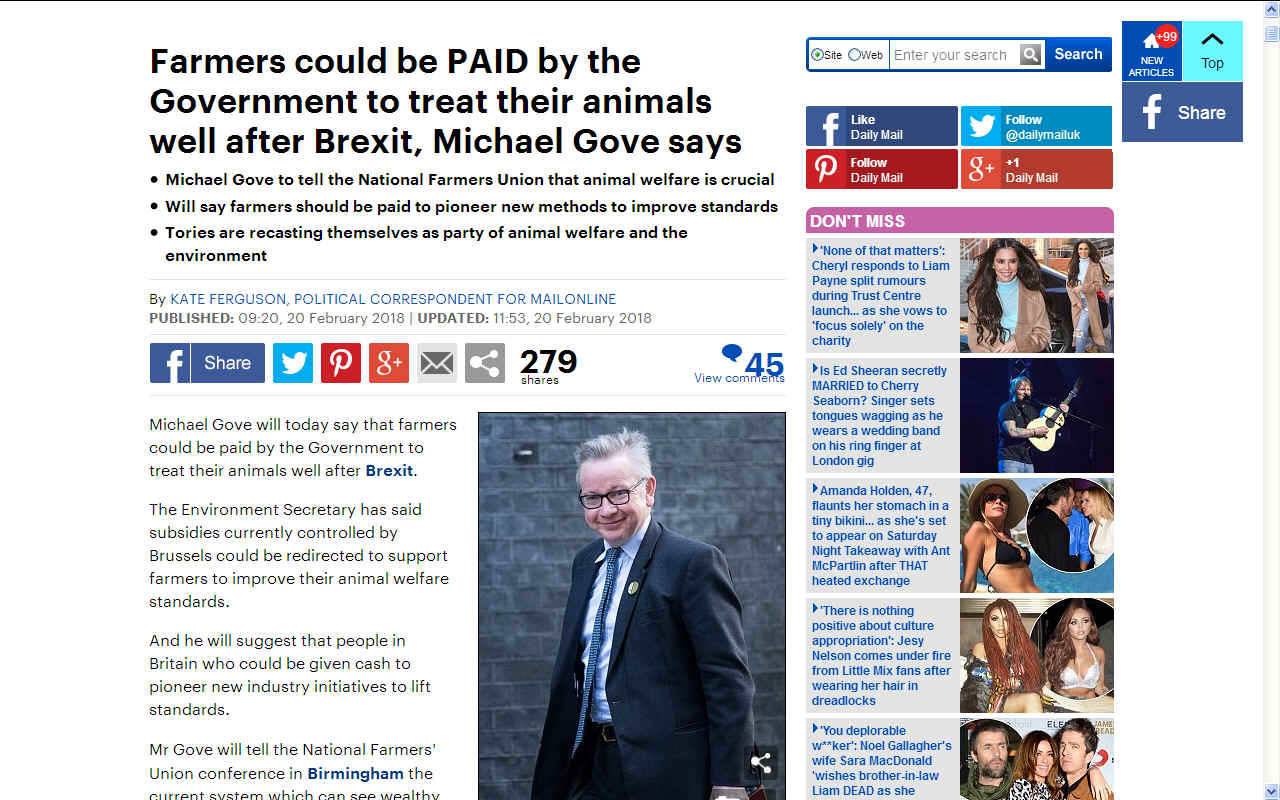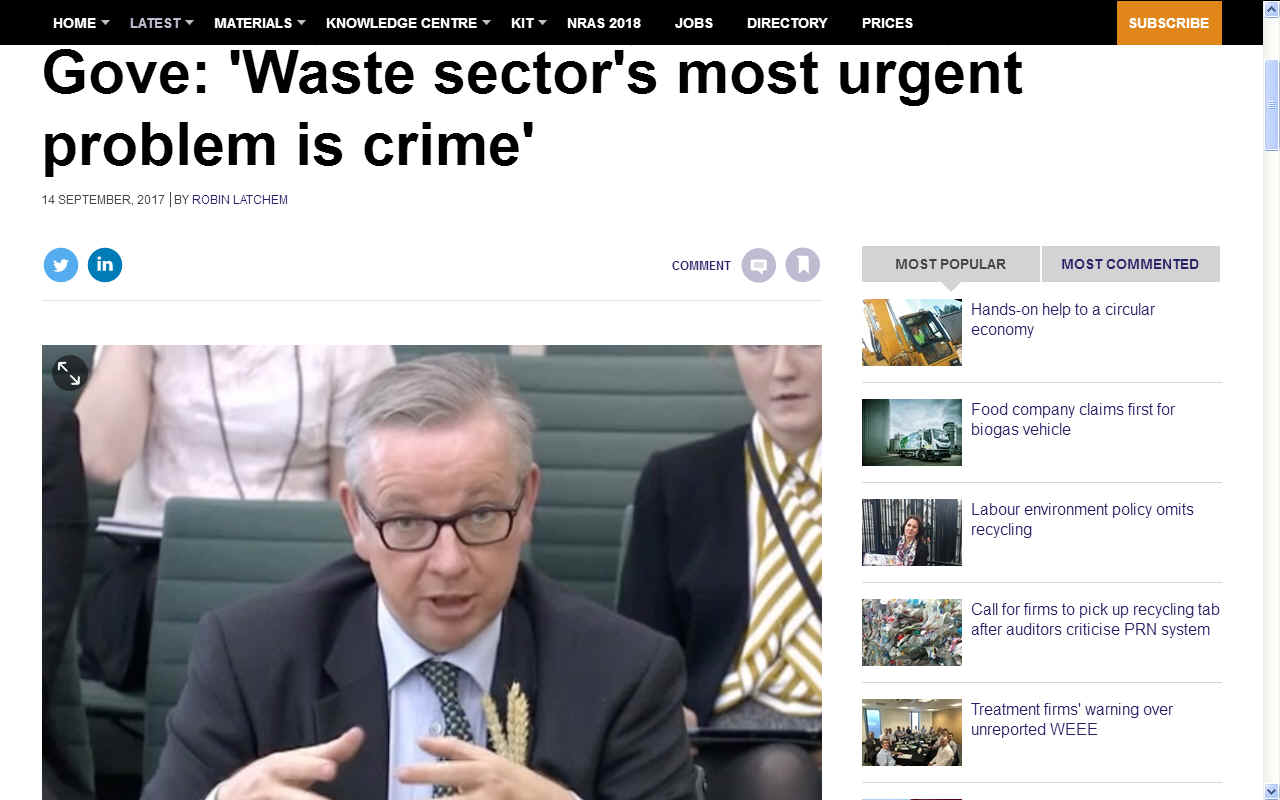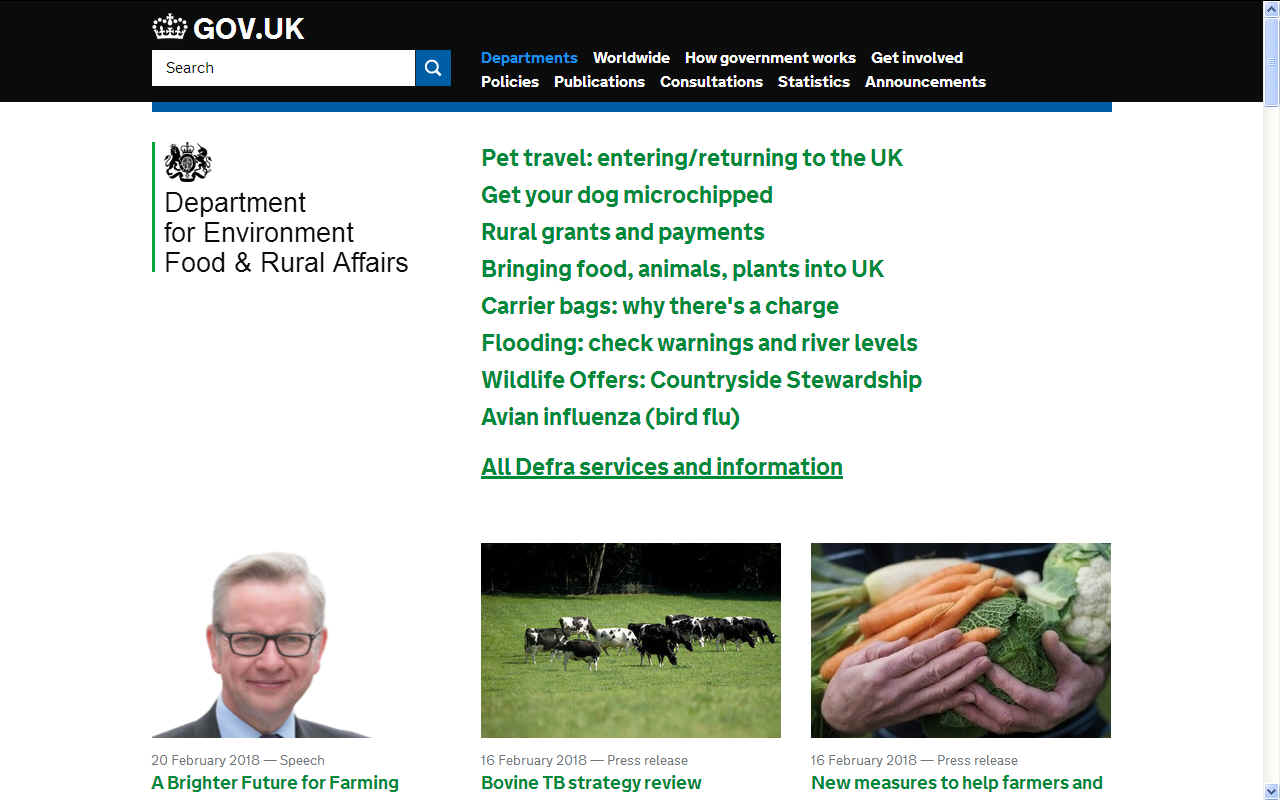|

ECO
WARRIOR - Good on you Michael, anyone who is looking out for
animal welfare is alright by us.
Michael
Gove is the Secretary of State for the environment at DEFRA,
the Department for the Environment Food and Rural Affairs. The Department for Environment, Food and Rural Affairs
is the government department responsible for environmental protection, food production and standards, agriculture,
fisheries and rural communities in the United Kingdom of Great Britain and Northern Ireland. Concordats set out agreed frameworks for co operation, between it and the Scottish Government, Welsh Government and Northern Ireland Executive, which have devolved responsibilities for these matters in their respective nations.
Defra also leads for Britain at the EU on agricultural, fisheries and environment matters and in other international negotiations on sustainable development and climate change, although a new Department of Energy and
Climate Change was created on 3 October 2008 to take over the last responsibility.

MRW
14 SEPTEMBER 2017 - Environment secretary Michael Gove has said the most urgent problem facing the waste sector is crime – and links to criminals in the wider community.
Gove was appearing before the Efra select committee which monitors the work of Defra. Labour MP John Grogan asked about his strategy for waste.
Gove said: “I’m taking a look at how we can move to a better policy on waste, a better policy on what’s been called the circular economy.
“One of the things I want to explore is how we can generate less waste in the first place and then ensure that the waste we do generate is
disposed of in the best possible
manner.”
Gove said crime was a priority.
“The most urgent problem we face in waste terms is illegal waste sites and that number has gone up recently. There are links between those who are operating outside the law in the waste industry and other criminal activity.”
He also confirmed that the delayed 25-year environment plan would be released before the end of the year.
He said officials were going through it “block by block” and indicated by raising his hands that, so far, waste had not been high on the agenda.
Committee chair Neil Parish asked for confirmation of rumours that Gove was rewriting the plan. The minister said he was “augmenting” it, suggesting that changes were “some fine-tuning adjustments”.
When Prior insisted he was indeed rewriting the plan, Gove did not correct him.
Adapting to Brexit had required extra staff at Defra, he confirmed, but he would need time to give the committee the exact figures.
He said the Treasury had stumped up extra cash because Brexit was having a bigger impact on Defra than other departments due to the number of EU regulations.
He added that he had been impressed by Defra staff since taking over the department after the general election and the UK civil service “has a great many highly skilled people”.
Grogan had initiated the discussion on waste by referring to the recent report on infrastructure from Eunomia, which reiterated the consultancy’s long-held belief that the UK faced an overcapacity of energy-from-waste (EfW) plants.
Earlier reports have been used by Defra to justify the withdrawal of financial support for large EfW schemes.
Gove said he did not know know about Eunomia but promised to come back to the committee with his views on incineration.
One of the lighter moments in the discussion about the subject was a reference to a Wagner opera which Gove attended with the former chancellor George Osborne.
Gove pointed out that, at the end of the opera, “the home of the Gods goes down in flames”.
Meanwhile the committee is inviting evidence on the impact on the UK food and farming sectors of potential new trading arrangements with the EU after Brexit.
One of five themes, for which responses are due by 20 October, asks: ”What trade policy objectives should Defra/UK Government establish in order to achieve the right balance between the interests of food consumers, producers and processors, and the
environment?”
DAILY
MAIL FEBRUARY 2018
Michael Gove will today say that farmers could be paid by the Government to treat their animals well after
Brexit.
The Environment Secretary has said subsidies currently controlled by Brussels could be redirected to support farmers to improve their animal welfare standards.
And he will suggest that people in Britain who could be given cash to pioneer new industry initiatives to lift standards.
Mr Gove will tell the National Farmers' Union conference in Birmingham the current system which can see wealthy landowners paid vast subsidies just one the basis of how much land they own should end.
And he will that instead Britain should invest the money in landowners who produce a 'public good'.
Mr Gove will say: 'Preserving profitable farm businesses in those communities is just as much a public good as investment in anything I know.
'I also believe investing in higher animal welfare standards and investing in improved training and education for those in agriculture and food production are clear public goods.
'We have a high baseline for animal health standards, which we will continue to enforce.
'However, we could also support industry-led initiatives to improve these standards, especially in cases where animal welfare remains at the legislative minimum.'
He will suggest the introduction of pilot schemes to pay farmers delivering higher welfare outcomes, or running trial approaches to boost animal wellbeing.
He will say that he beautiful rolling hills of Devon and Somerset is shaped by their dairy farmers.
And that Cumbria, Northumberland, the Pennines and Yorkshire Dales would not be 'breathtakingly beautiful' and resilient without upland farmers.
Some farmers have voiced fears that barriers to trade and free movement could hit the agricultural sector as workers like fruit pickers from other parts of
Europe stop coming to the UK.
While others have viced fears that free trade deals with countries like the US could see standards plummet and the introduction of cheap imports of produce such as chlorinated chicken and hormone-fed beef.
But Mr Gove, who has recast himself as an eco-warrior since being brought back to the Cabinet last year, will insist that animal welfare standards will not be cut when
Britain quits the bloc.
And he will repeat his support for funding measures such as planting woods to stop
flooding and creating wildlife habitats.
But he will also say future methods of agricultural support should preserve the heritage and culture of farming communities which maintain precious landscapes.
LINKS
& REFERENCE
https://www.gov.uk/government/organisations/department-for-environment-food-rural-affairs
http://www.dailymail.co.uk/news/article-5412109/Gove-Farmers-PAID-treat-animals-well.html

DEFRA
- Deals with rural grants, climate change and agriculture. It's a
mixed bag that gives the Secretary of State a lot of interesting ways of
doing some good for the country.
CONSERVATIVE MPs 2018
ALUN
CAIRNS
AMBER
RUDD
ANDREA
LEADSOM
BARONESS
EVANS
BORIS
JOHNSON
BRANDON
LEWIS
CAROLINE
DINENAGE
CAROLINE
LUCAS
CHRIS
GRAYLING
CLAIRE
PERRY
DAMIAN
GREEN
DAVID
CAMERON
DAVID
DAVIS
DAVID
GAUKE
DAVID
LIDLINGTON
DAVID
MUNDELL
GAVIN
WILLIAMSON
GREG
CLARK
HUW
MERRIMAN
JACOB
REES-MOGG
JAMES
BROKENSHIRE
JEREMY
HUNT
JEREMY
WRIGHT
JESSE
NORMAN
JUSTINE
GREENING
KAREN
BRADLEY
LIAM
FOX
LIZ
TRUSS
MARGARET
THATCHER
MICHAEL
GOVE
NUSRAT
GHANI
PATRICK
MCLOUGHLIN
PENNY
MORDAUNT
PHILIP
HAMMOND
STEVE
DOUBLE
THERESA
MAY
TOM
BRAKE
SAJID
JAVID
CAROLINE
ANSELL - CAROLINE
LUCAS - CHARLES
CLARKE - CHARLES
HENDRY - CHRIS
GRAYLING - DAVID
BLUNKETT
DAVID
CAMERON - DAVID
MILIBAND - ERIC
PICKLES - GEOFFREY
JOHNSON-SMITH - GEORGE
OSBORNE - GORDON
BROWN
GREG
CLARK - GREGORY
BARKER - HUW
MERRIMAN - JACK
STRAW - JOHN
GUMMER - JOHN
PRESCOTT - KENNETH
CLARKE
KIM
HOWELLS DR - MARGARET
BECKETT - MARGARET
THATCHER - MARIA CAULFIELD - NICK
CLEGG - NORMAN
BAKER - NUS
GHANI
PATRICIA
HEWITT - PHILIP
DUNNE - PHILIP
HAMMOND - SAJID
JAVID - STEPHEN
LLOYD - TERESA
MAY - TESSA
JOWELL
TONY
BLAIR - VINCE
CABLE
|


